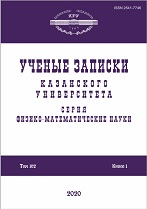|
Analysis of formulas for numerical differentiation of functions with large gradients on a Bakhvalov mesh
N. A. Zadorin
Sobolev Institute of Mathematics, Siberian Branch, Russian Academy of Sciences, Novosibirsk, 630090 Russia
Abstract:
The article gives an estimate of the error of the classical formulas for the numerical differentiation of a function of one variable with large gradients in the exponential boundary layer. It is assumed that the function is decomposed in the form of the sum of the regular and singular components, which is valid for the solution of a boundary value problem for the ordinary second-order differential equation with a small parameter $\varepsilon $ affecting the highest derivative. It is known that the application of the classical polynomial formulas of numerical differentiation to such a function in the case of a uniform mesh can lead to unacceptable errors. The article estimates the error of the formulas for numerical differentiation on the Bakhvalov mesh, which is condensed in the boundary layer region. Bakhvalov's mesh is widely used to construct uniformly converging difference schemes; therefore, the error estimation of the numerical differentiation formulas on this mesh is of interest. The estimates of the error on the Bakhvalov mesh are obtained taking into account the uniformity in the small parameter for the classical difference formulas widely used to calculate the first, second, and third derivatives. The results of numerical experiments are presented, which agree with the obtained error estimates. A numerical comparison of the obtained errors on the Bakhvalov and Shishkin meshes and on a uniform mesh is carried out.
Keywords:
function of one variable, boundary layer, large gradients, Bakhvalov mesh, formulas for numerical differentiation, error estimation.
Received: 03.02.2021
Citation:
N. A. Zadorin, “Analysis of formulas for numerical differentiation of functions with large gradients on a Bakhvalov mesh”, Uchenye Zapiski Kazanskogo Universiteta. Seriya Fiziko-Matematicheskie Nauki, 163, no. 3-4, Kazan University, Kazan, 2021, 261–275
Linking options:
https://www.mathnet.ru/eng/uzku1595 https://www.mathnet.ru/eng/uzku/v163/i3/p261
|

| Statistics & downloads: |
| Abstract page: | 206 | | Full-text PDF : | 122 | | References: | 17 |
|




 Contact us:
Contact us: Terms of Use
Terms of Use
 Registration to the website
Registration to the website Logotypes
Logotypes








 Citation in format
Citation in format 